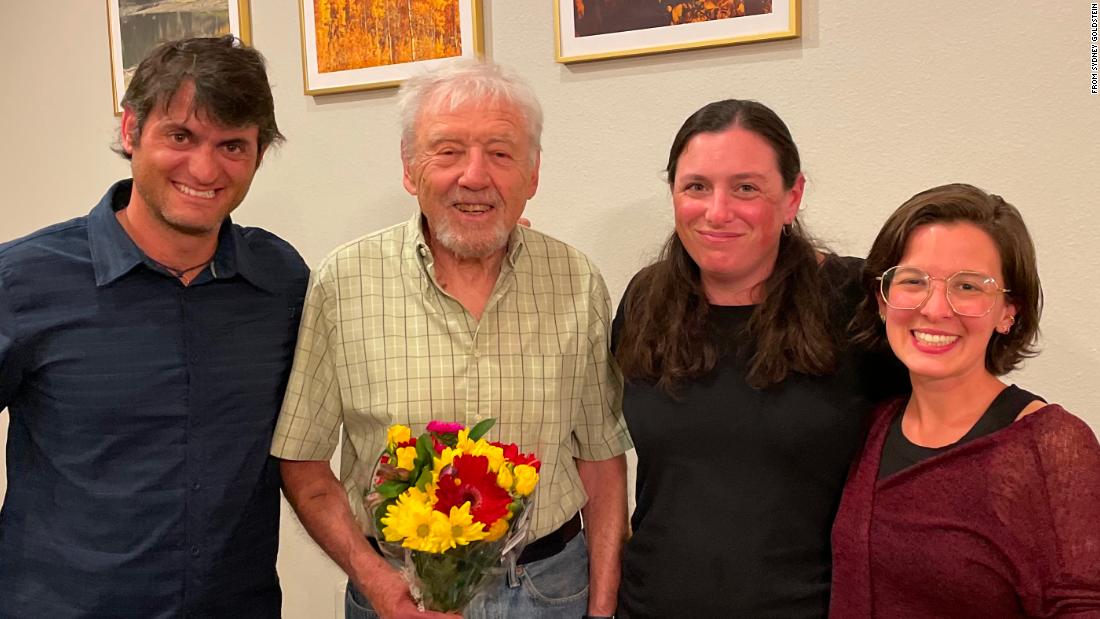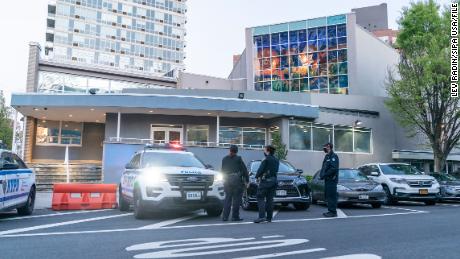
Sydney Goldstein, 28, with a little help from others, saw to it.
Goldstein said she tried to register for the event but the online link didn’t work. She later learned the program had been canceled because of low registration, she said.
“This kind of sparked a fire in me,” Goldstein recalled on Saturday. “There will be a time soon unfortunately where Holocaust survivors aren’t going to be around any longer and so we can’t waste a single year.”
She tracked down Fridland’s number and left a message to see if he could attend a last-minute event she hastily put together. Fridland, a retired scientist, had to call her back because he was on a bike ride.
“You know I live in Colorado,” Fridland joked in an interview with CNN. “I’m forced to try and pretend I’m still 25.”
Word spread, and Zoom call reached capacity
Goldstein, a doula, was a nanny for Gal and Maya Weinstock, who agreed to host the event at their home.
“We just started rapid fire messaging everyone to really show support,” said Goldstein, adding that the Weinstocks also reached out to Israeli friends living in Boulder.
She also announced the event on Instagram and received about 50 messages. Goldstein said she set up a Zoom video conference for the talk. About 30 people showed up at the Weinstock home.
“I thought like tops 20 people were going to show up on the Zoom,” Goldstein said.
Fridland began to speak and soon the Zoom reached a capacity of 300 people, Goldstein said.
“I kept getting messages from people: It’s at capacity. What do we do? So I went on Instagram Live and we had over 600 interactions on that. Someone from Bangkok had joined. It was like a worldwide event.”
Fridland spoke about walking the streets of Belgium as a boy, his father tightening the grip on his hand as lines of German soldiers walked past.
“It was exciting to watch. It was scary to watch but all the time I realized they were dangerous,” he said.
“As my mother told me before, ‘We’ll be together soon — again,'” he told CNN. He recalled that dozens of Jewish children were taken in and saved by many non Jewish families.
“People who had very little themselves were still willing to help a Jewish child,” he said.
The evening was one of the most unforgettable experiences of Goldstein’s life, she said.
“It’s just so beautiful how the community came together to really show Arnold that we care and that we know this is something that’s very important and we’re invested in his story and we want to listen, and show him we’ll never forget,” she said.
“It was a beautiful example of the power of community, the power of a spark and a few people who wanted to make a difference and then that caught like wildfire.”
‘It was extremely inspiring’
“When I joined … there were only around seven people on and so I immediately went and shared it on my Facebook, Instagram and Twitter to hopefully get more people on — and I’m sure others did as well,” he said. “And just 20 minutes later the Zoom hit its capacity at 300 people, with people pouring in from around the world and around the US.”
“The opportunity to interact with survivors, to directly hear from them and their stories, is only going to become fewer and fewer as the survivors get older unfortunately,” he said. “And even now, we have Holocaust deniers while there are still living survivors, and so it’s on us, the next generation, to continue to pass along stories like Arnold’s — which is why I think it resonated with so many people.”
At the end of his presentation, Fridland politely thanked his audience. There was a round of applause.
Goldstein stepped forward and said of Fridland’s story: “It’s all over America. It’s all over the world.”
“Amazing,” he said, with a slight smile.
“He was able to live such a beautiful, full, happy and successful life after experiencing such darkness at such a young age,” Goldstein said Saturday.
“It was extremely inspiring and made me realize even more deeply what an honor it was to get to meet Arnold and have him share his story.”
